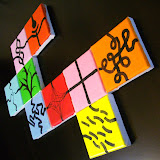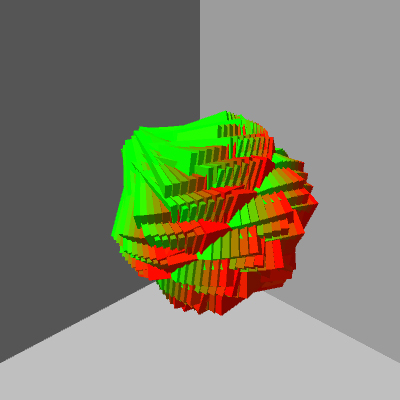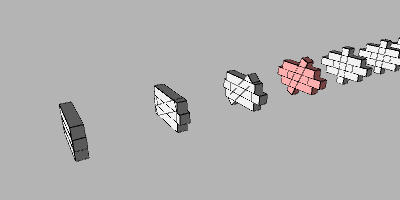Warning: The following is very self-indulgent and is largely for my own personal exploration than for your enjoyment. However, there is a question at the bottom that I'd like you to answer even if you zone out in the middle of the post!
DanC just dropped an awesome post attempting to add a bit more specificity to the title of 'game designer'. I commented there, but I would like to indulge myself and go in to a bit more detail, and really dig into what it means to me to be a Game Designer.
During my job hunt, I've had to tell a number of people that I'm a game designer in a way that's meaningful for them. So far, my professional experience consists entirely of Multiplayer for First Person Shooters, and Flash-Based Casual Games. See, that's what's written on my resume; that's what the people seem to care about. Every time I've had a conversation about my skills as a designer, it's always about what games I've made. It's assumed that game genre directly correlates to 'designer genre'. Therefore, I am an FPS designer. And I am a Casual Game designer. Except neither of those quite accurately describe what I'm good at.
What Makes Me Happy
But before I get to what I'm good at, I'd like to talk about what I like. Passion is a powerful driver, and I believe it is often a substitute for skill, because passionate people will acquire necessary skill, and even relish it, whereas skilled people with no passion get stuck.
Not to say I'm not good at these things; I am! But it's my passion for them that makes me shine here.
I love exploring systems, using systems, creating systems, pushing systems. I love procedurality, I love complex mechanics, I'm completely enamoured of cause and effect. I love procedural art, because it's art generated by system. I love programming because it's.. well, systems inherently. But it's not just a game with systems in it that makes me happy. It's systems as a way of designing games.
For example, it's very important to me when designing to establish a methodology or design pillars. Basically, any set of rules or principals that can be used to evaluate design decisions, that isolate and identify the most and least important aspects of the game, that guide each member of the team into a unified mind-set. Some people may balk at this, not wanting to shackle themselves with these kind of big decisions, instead keeping the design more organic and free-form. Not me... Systemic!
It's also crucial in each of my designs that they are explorative and mechanically surprising. I'm one of those guys who feels that the player narrative is more powerful than the designer narrative, so making sure that the game is reactive enough that every player gets a unique and interesting narrative is paramount.
The other thing that really drives me as a designer is 'moments of experience'. These are specific sensations, either mechanical, visual, musical, whatever, that I strive to achieve. It's a kind of beacon that I use to move towards, and is very powerfully motivating for me.
It's to my personal taste to have a small number of highly-polished features than to have a wide variety of rough features. I think it's perfectly acceptable for a game to have no backstory, or even no art, or only one mechanic, so long as it conveys the idea that the designer had in mind. Conversely, If there is a graphic, I prefer for that graphic to be a pixel-perfect, colour-tuned, proportionate wonder. I like my mechanics sharpened to a fine point. No gaps in animation, no reactionless interaction.
What I'm Good At
Curiously, one thing that I have learned a lot about by working on shooters is Multiplayer. Although it's right there on the resume, people kind of gloss over that as a skill and focus on the FPS part. But really, I think that multiplayer (and specifically competitive multiplayer) is a very general kind of design that is unrelated to genre; it's about making sure that there is a clear winner and loser, that the game is fair (and, more importantly, feels fair), that the loser is motivated to keep playing. In multiplayer, each player is effectively the content for the other player, so the designer has to motivate each player to work in a way that creates interesting gameplay for their opponents, for example by encouraging conflict through level design, by ensuring that the tools available to each player have a visible impact on their opponents game, and so forth.
My proof that this is not a genre-specific skill is that I have been able to apply a lot of the things I learned doing multiplayer for shooters to making multiplayer casual games. And in fact, a lot of these same concepts are even applying to a project I'm working on concerning community design.
Another thing that I seem to have a real knack for is considering how the game serves the player. Although I think this is a critical skill for every designer to have, it's clear from playing games that some teams have this and some don't. This means things like valuing good tutorials, having self-explanatory interfaces, making sure that feedback is strong. Basically, it's important to me that my time is spent considering what's happening 'above the hood' rather than obsessing over how elegant a system is or reveling in the details of a character's description.
The Weaksauce
On the flip side, I really don't enjoy anything to do with story in the classic sense. That is to say, I have zero interest in telling stories. I often have lots of ideas for stories that I want players to experience, but they are always their stories. I'm more than willing to provide a world and a context, but as far as I'm concerned the story is none of my business. An example of this is The Sims, or Dwarf Fortress. Each of these has a kind of plot ("The life of an ordinary person" or "A group of dwarves striking a new colony"), but after that context is established, it's up to the player to write it. (That's not to say that characters or environments don't have stories, just that the player's arc in the game has no predefined narrative.)
So naturally, when it comes to narrative (and creative writing in general I must admit) I fall short... likely from lack of passion. I'm a very good editor and my internal thesaurus is strong, but I don't invent plots or characters very well, tending to lean towards systems and mechanics in my creative design.
Howdunnit
As important as describing the kinds of designs I make, is describing how I make designs.
First and foremost, for me design is something collaborative. I feed off other peoples ideas, and feed off their energy. I think there is nearly infinite value in getting fresh opinions. (Incidentally, something else I take pride in is my discernment of feedback. Without this skill, opinions can be overwhelming and cause a lot of flagging.) Because I never feed like a design is 'mine', I tend towards not being defensive or protective of it, and because I try very hard to establish a design manifesto and keep my expectations clear, I have no qualms with discussing with people when their ideas do or don't fit the design of a game.
As well, I think that design is fundamentally holistic. That's why it's so important to me as a designer to have a strong grasp on art and code and business and team dynamics, etc. One can be a creative visionary and get all hand-wavey when it comes to implementation, but as a production game designer who is determined to release to the world the best games possible, it's critical for me to know the full ramifications of any design decisions I make, and to be able to react appropriately to feedback and issues.
I'd rather have a meeting than write a document. I'd rather code it/draw it than describe it. I'd rather ask an opinion of how it should be and then make a decision, than make a decision and get an opinion on it. I'd rather spend time up front making tools and prototypes and making decisions, and strive to get things right the first time. I have a burning desire to be involved in every bit of the development, to make sure that at the least my opinion is heard, even if I don't directly contribute to a creation.
I'm really curious: Those of you that have worked or designed with me, what have you noticed most about my design style? What stands out to you about me that I should really value, or need to improve on, or that you agree or disagree with?
 Monday, March 9, 2009 at 07:19PM in
Monday, March 9, 2009 at 07:19PM in  tools
tools 




